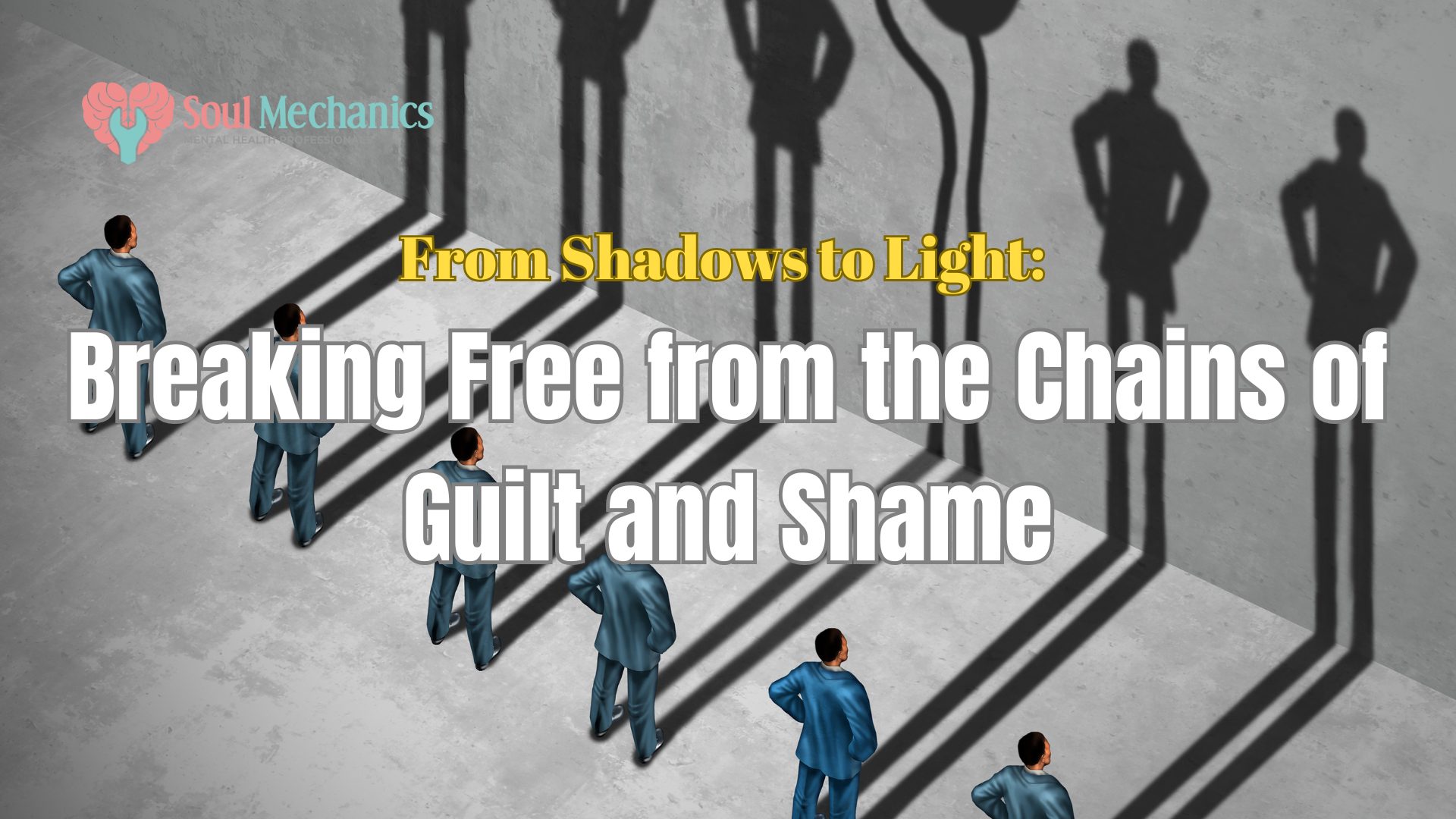Guilt and Shame Management: Breaking Free Tips
Guilt and Shame Management: Breaking Free Tips

Written By: Shaundtrya Ganasan, Licensed Counselor (KB11097)
Do you often feel guilty or ashamed of yourself?
Is guilt the ultimate weapon to hit you?
Are you your very own critic?
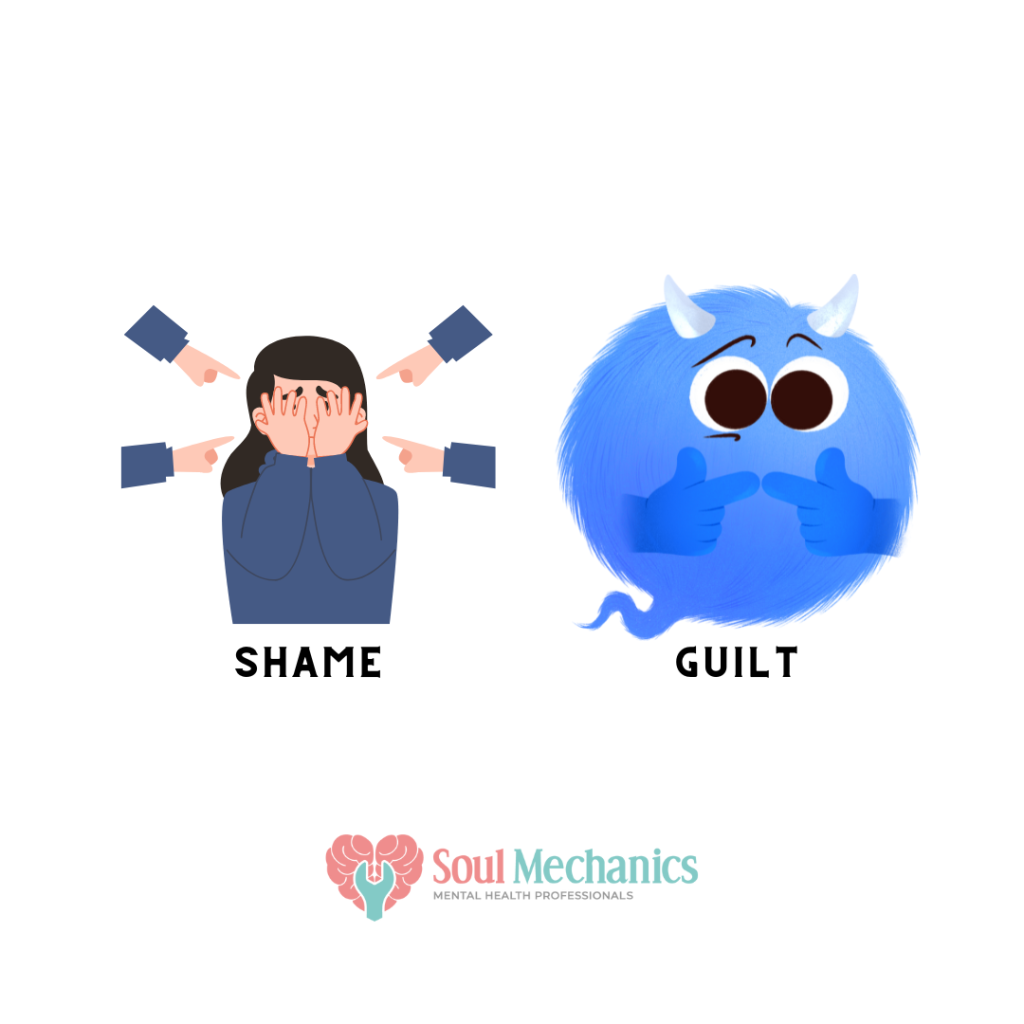
Guilt and shame are two powerful emotions we often experience. They often lurk hand-in-hand behind our consciousness. Although they are a part of an internal emotional wheel, they can get overwhelming.
As a therapist, I found many do struggle with these emotions whereby they are one of the strong underlying emotions causing them to find it hard to move forward or struggle with mental health concerns. In this article, let us dive into understanding these emotions and how to manage them more healthily.
Reminder: If you or your loved ones are struggling with mental health issues, please don't hesitate to reach out to us at Soul Mechanics KD or Soul Mechanics Ipoh. Remember, seeking help is not a sign of weakness but strength!
The Nature of Guilt and Shame
Guilt and shame, often utilized interchangeably, do have distinct characteristics. Guilt arises from actions that you usually regret about. It is a feeling that you have done something unforgivable or wrong. Whereas, shame is the feeling where there is something wrong with you whereby you find yourself flawed. Guilt at times can be constructive, as it prompts you to make amends for your mistakes and improve your actions in the future. Shame, on the other hand, can be destructive, where it leads to a sense of unworthiness.
The Emotional Shadows
Imagine guilt and shame to be a heavy, knotted blanket. Guilt is the knot in the blanket, whereby it could be a specific problem or wrongdoing that can be acknowledged and undone. Shame, on the other hand, is the blanket itself. Its heaviness and entanglement can feel pervasive and suffocating. To manage these feelings, you must not only untangle the knots but also work on lightening the heaviness of the blanket, which includes addressing its deeper, underlying roots.
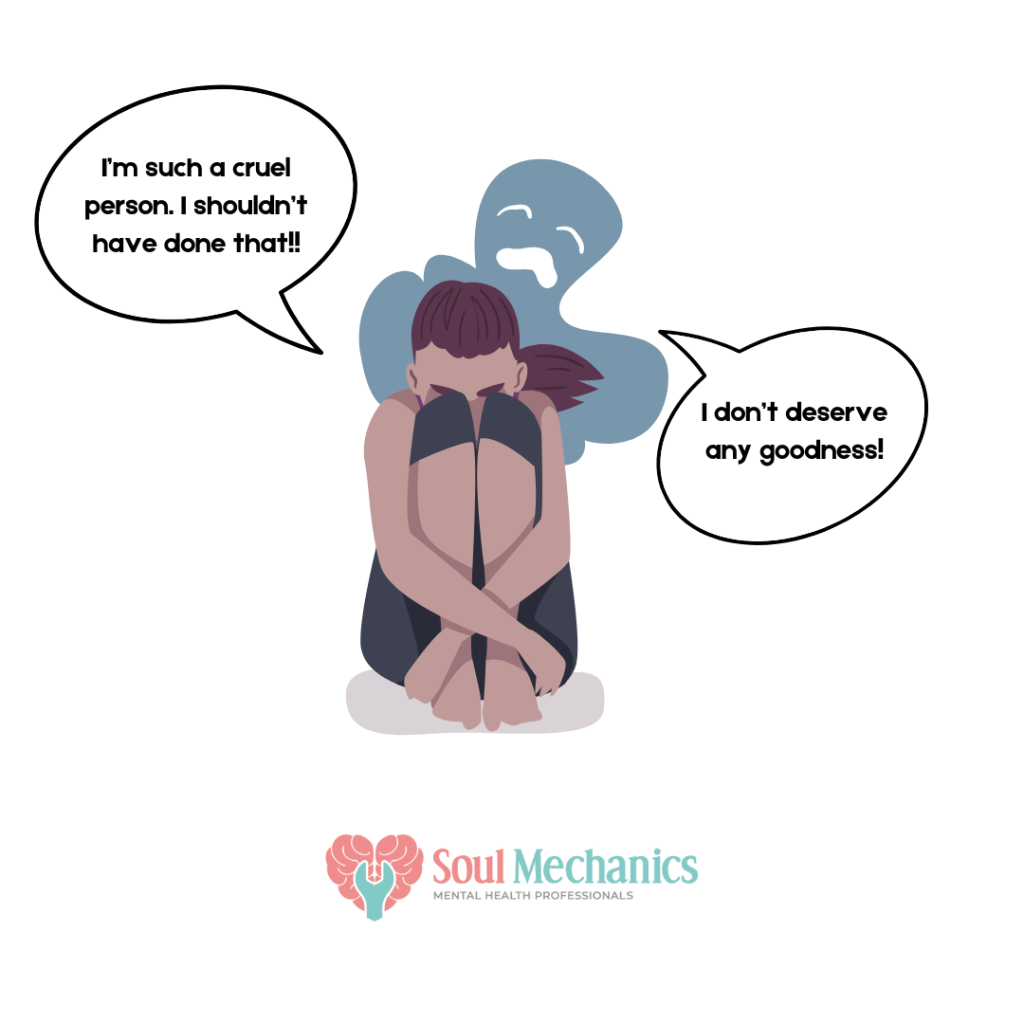
The Impact on Self & Relationships
Impact on Self
Self-Esteem - Both guilt and shame can shake your self-esteem. Guilt often leads to self-criticism and self-blaming, which can erode your self-worth. Whereas, shame attacks the core of your identity; self-perception. This leads to a sense of self-loathing and worthlessness.
Mental Health - Persistent and intense guilt and shame are often associated with mental health concerns like anxiety and depression. The heavy weight of these feelings can cause chronic stress and negative self-perception.
Behavioural Patterns - Guilt and shame can also influence your behaviour, causing tendencies of avoidance, self-sabotage, or perfectionism. These patterns stem from the motive to avoid these feelings of inadequacy - not good enough or to compensate for the perceived wrongdoings.
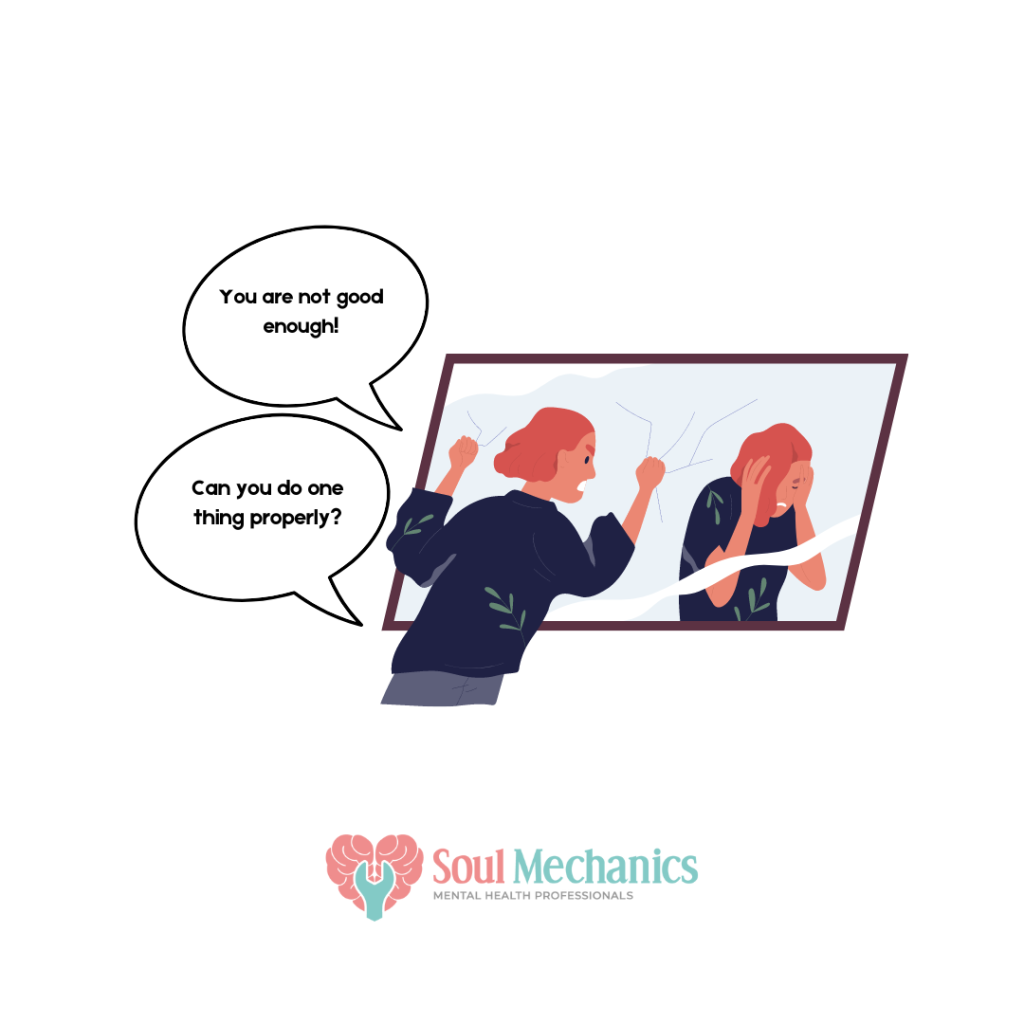
Self-Compassion - Intense guilt and shame can undermine your capacity to allow and practice self-compassion. When you feel overwhelmed by these feelings, you may find it tough to offer yourself kindness and understanding, leading to a loop of self-criticism.
Identity Formation - Prolonged feelings of guilt and shame can interfere with your identity formation. You may develop an unhealthy or distorted self-concept based on your perceived inadequacies or failures. This can have a huge impact on your sense of self.
Impact on Relationships
Intimacy - Guilt and shame can create barriers to intimacy with others, especially your partner. You may distance yourself from your loved ones due to fear of rejection or being judged. This makes it further tough for you to form close, intimate and meaningful relationships with others.
Communication - Both these emotions can also impact your communication, whereby misunderstandings and conflicts tend to happen. Shame, in particular, has the ability to make you less likely to express your needs and feelings openly.
Reminder: If you or your loved one are struggling with relationship issues, please don't hesitate to reach out to us at Soul Mechanics KD or Soul Mechanics Ipoh.
Remember, seeking help is not a sign of weakness but strength!
Trust - Guilt and shame can undermine your trust in relationships with others, particularly romantic ones. You may struggle with trust issues, either due to the intense fear of judgment or the sense of unworthiness of love.
Conflict Resolution - These emotions also have the tendency to complicate your conflict resolution skills. You may either become excessively apologetic or overly defensive about your actions or any conflicts. This makes it challenging for you to address and resolve conflicts effectively and healthily.
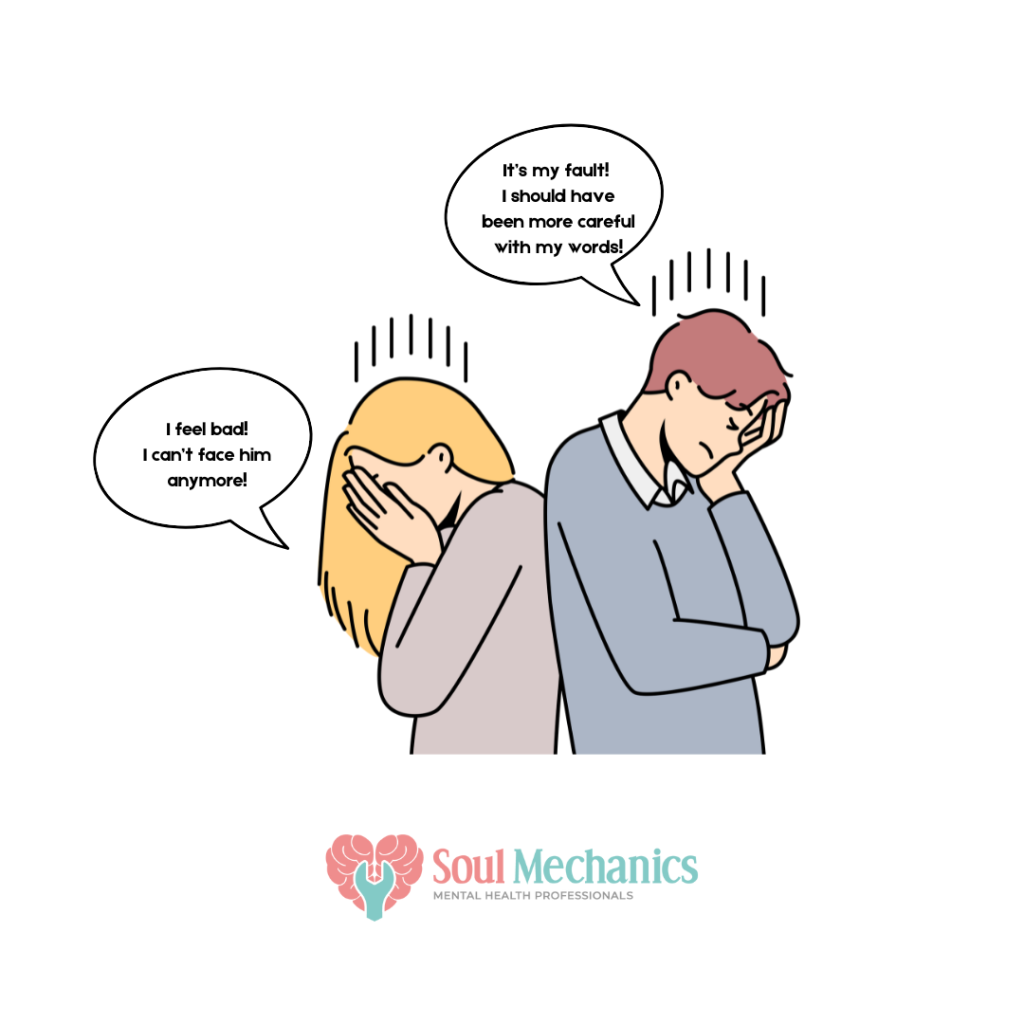
Emotional Availability - When you are burdened with guilt and shame, you may find it challenging to be emotionally available to others. Your preoccupation with your feelings can hinder your capacity to engage with empathy with your loved ones or partner.
Connection to Attachment Styles
Attachment styles, usually form in the earlier stages of your life, which significantly impacts how you experience and cope with these heavy emotions - guilt and shame.
Secure Attachment - When you have a secure attachment style, you generally tend to have better guilt and shame management. You tend to also have a stronger foundation on your sense of self and trust in others. This can guide you to navigate through these emotions more healthily and effectively.
Anxious Attachment - If you are someone with an anxious attachment style, you may experience heightened and intense feelings of guilt and shame. You may fear being abandoned and tend to believe that your mistakes would lead to rejection. This increases your susceptibility towards guilt and shame.
Avoidant Attachment - If you’re someone with an avoidant attachment style, you tend to suppress or deny your feelings of guilt and shame. You may also struggle to acknowledge and address these feelings which can lead to a lack of emotional intimacy in relationships.
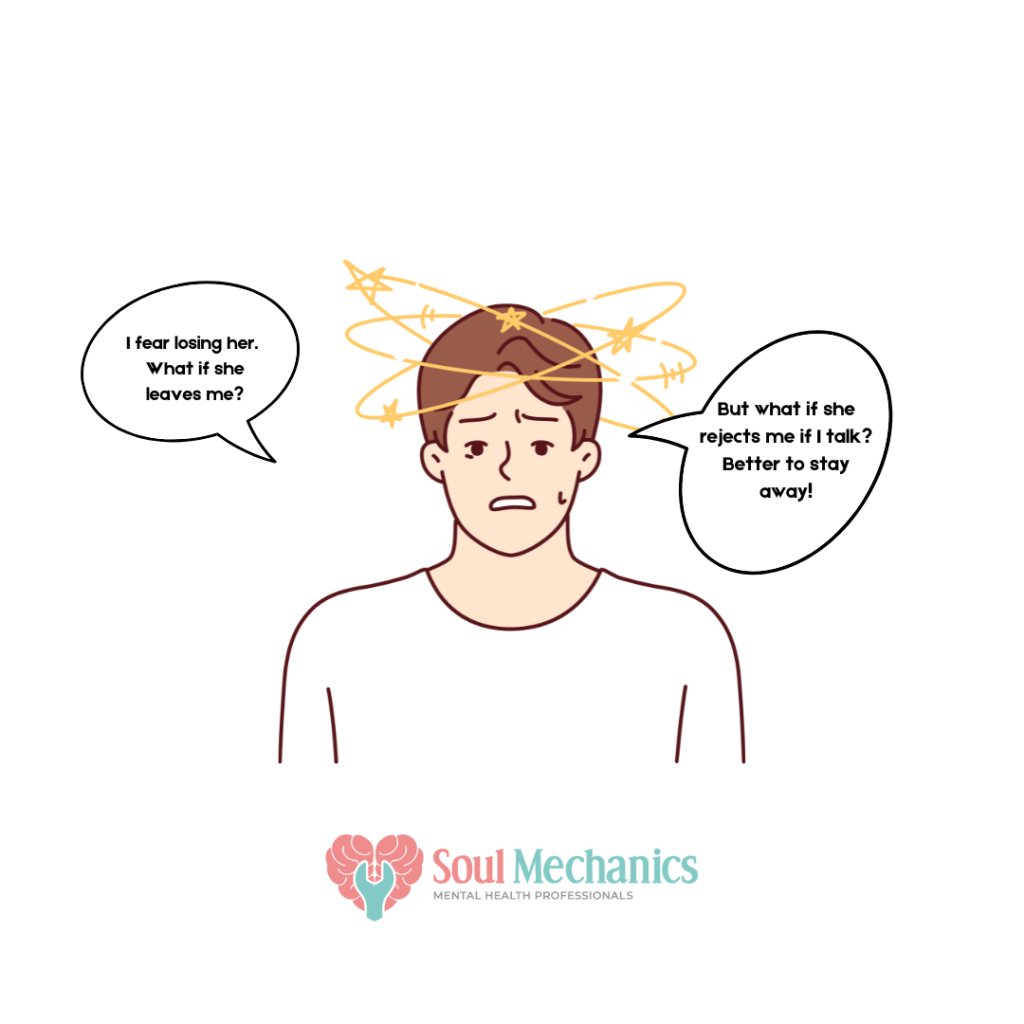
Disorganized Attachment - If you have a disorganized attachment, you have a mix of both anxious and avoidant behaviours. You may feel conflicted regarding your guilt and shame which leads to unpredictable emotional responses and challenges in your relationships.
Reminder: If you or your loved ones are struggling with mental health issues, please don't hesitate to reach out to us at Soul Mechanics KD or Soul Mechanics Ipoh. Remember, seeking help is not a sign of weakness but strength!
Origins of Guilt and Shame
Generational Trauma
Generational Trauma also known as intergenerational trauma is the transmission of trauma through the generational lane. This can manifest in the form of guilt and shame passed down from parents to their children. For instance, if you are a child of parents who experienced trauma, you may inherit their emotional burdens, including feelings of unworthiness or inadequacy. These inherited emotions can create a legacy of self-criticism and internalized shame.
Inherited Patterns - Emotional responses and copings related to guilt and shame can be often inherited from ancestors. These patterns may not be directly experienced but can have an influence on your present emotional state and behaviours.
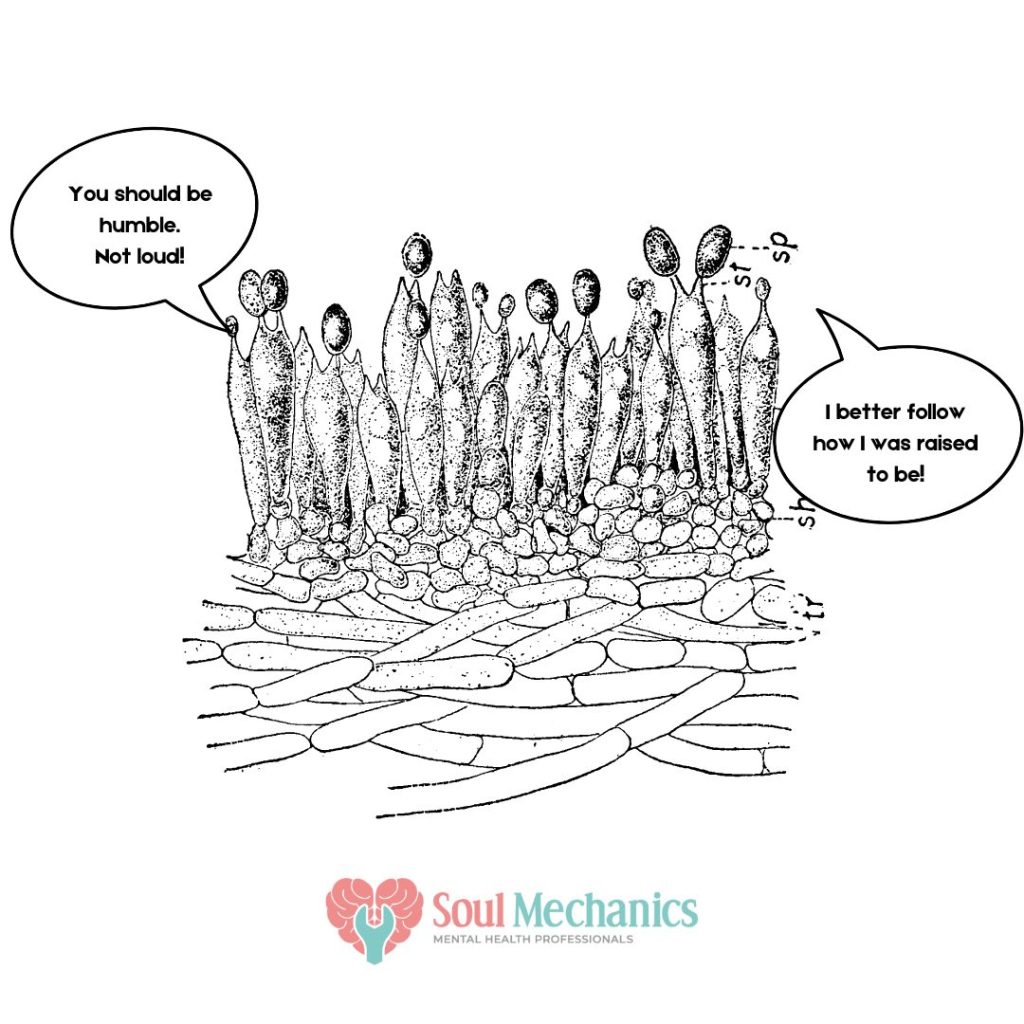
Cultural Expectations - Generational trauma also involves societal and cultural expectations which can perpetuate your feelings of guilt and shame. These expectations can become deeply rooted in your family dynamics and influence your self-perceptions.
Family Dynamics - Dysfunctional family dynamics, like high expectations or punitive behaviours, can lead to the development of guilt and shame through generations. The emotional environment in which you are raised plays a huge role in shaping your guilt and shame.
Coping Mechanisms - The approaches in which your previous generations may have coped with trauma can also influence your present patterns of guilt and shame. These copings can be passed down across generations, influencing how you manage your emotions in the present.
Modelling - Imitate Parent’s Behavior
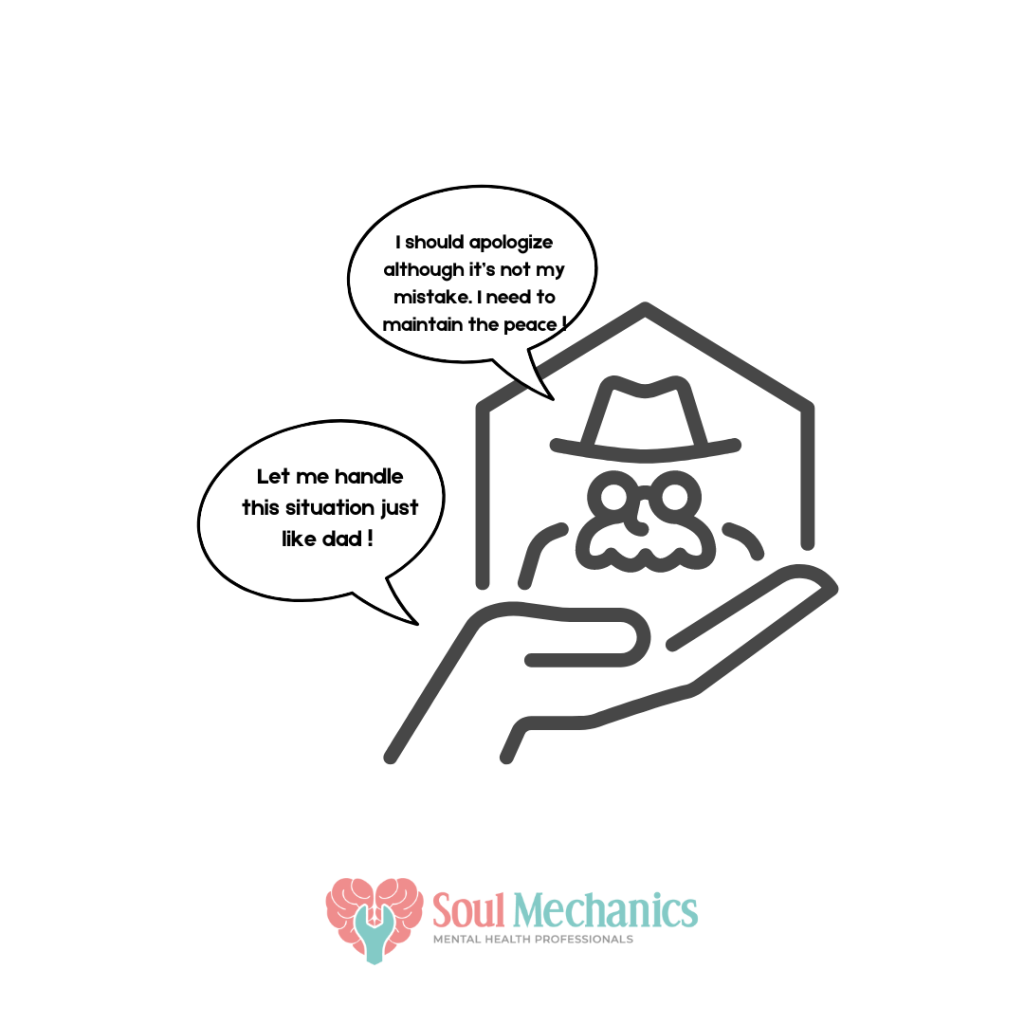
As a child, you usually learn about guilt and shame by observing and mimicking your parents’ behaviour. If your parent shows excessive guilt or shames you, you may adopt similar patterns of self-blaming or self-criticism. This modelling can perpetuate into an unhealthy emotional loop through generations, whereby you grow up repeating similar observed patterns.
Behavioural Reinforcement - Your parents’ reaction towards your own mistakes can reinforce your patterns of guilt and shame. You may adapt to react in an almost similar manner to perceived failures.
Role Modeling - The approach your parents handle their guilt and shame also becomes your template to deal with these heavy emotions. If your parents model you with unhealthy responses, like avoidance or self-blaming, you may also replicate their behavioural patterns.
Expectations & Standards - Parents' standards and expectations can set a benchmark for you which creates a sense of pressure to meet them. When you fall short of those expectations, you may experience guilt and shame depending on how your parents react towards those shortcomings.
Inner Child Wounds
Inner child wound stems from unresolved childhood issues. When parents, family members, teachers, friends or bullies guilt-trip you as a child, it can instil a deeply rooted feeling of guilt and shame within you. These experiences tend to be internalized, affecting your self-image and responses towards these emotions. Healing these wounds is crucial to break free from these patterns.
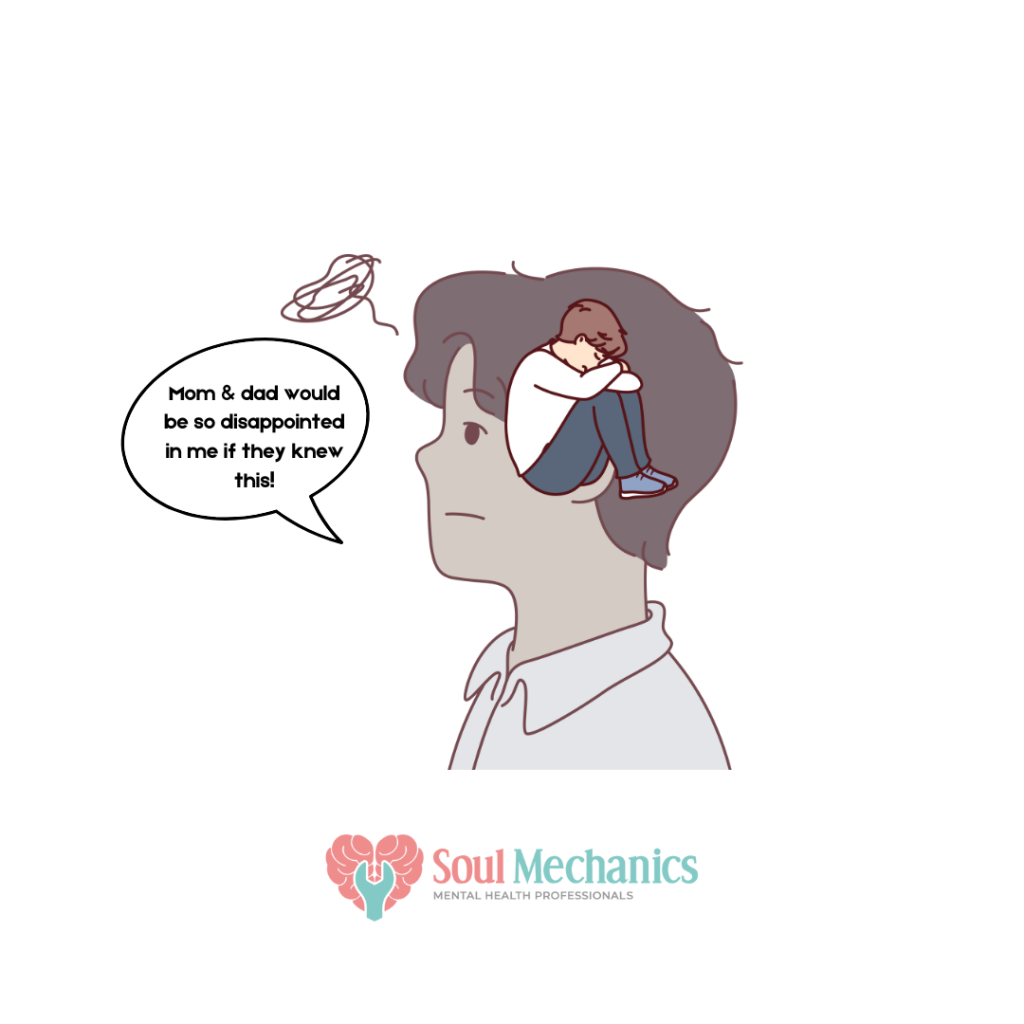
Emotional Imprints - Negative interactions as a child, such as criticism or blame can create deep emotional imprints within you that shape your future responses towards guilt and shame. These imprints can also develop into low self-esteem and persistent self-judgement.
Attachment to Past Experiences - Holding onto past experiences of guilt and shame also allows these heavy feelings to influence your present behaviour and relationship patterns. Addressing and working on these attachments is essential for emotional healing.
Reminder: If you or your loved ones are struggling with mental health issues, please don't hesitate to reach out to us at Soul Mechanics KD or Soul Mechanics Ipoh. Remember, seeking help is not a sign of weakness but strength!
The Power of Vulnerability
Vulnerability is often viewed as a weakness, which is actually a strong, yet powerful part of human experience. It involves you to be transparent and honest about your emotions, which include guilt and shame. Learning to embrace vulnerability can lead you to experience emotional growth and healing.
The Strength of a Cracked Vase

Imagine your vulnerability to be a beautiful, delicate vase with some cracks. These cracks are not flaws but areas that can pass and shine through. The vase’s imperfections - the cracks allow it to be more open and transparent. This creates a space for both beauty and light to emerge. Embrace vulnerability by allowing yourself to be seen for who you are, with all your imperfections and shortcomings. This openness can cultivate deeper connections with others and approach feelings of guilt and shame healthily and effectively.
Practical Tips to Work on Guilt & Shame
Creative Expression - Utilize art, music, or writing to express and process your emotions. Externalizing and making these feelings tangible can make them more manageable and provide you with insights into their roots.
Therapy - Therapy can be a guiding light for you to explore these difficult emotions; guilt and shame. A professional therapist would guide you to dive into the underlying, understand your patterns of guilt and shame, and create more personalized coping to manage these emotions healthily and effectively.
Body Awareness Exercises - Take some time to sit with these emotions. Inhale and exhale, as you scan your body to identify which part of your body feels this guilt or shame. Use relaxation techniques such as deep breathing, yoga, progressive muscle relaxation or meditation to release the tension in those areas.
Self-Compassion Letter - Pen down a letter to yourself from a compassionate friend, mentor, or any loved one’s perspective. Address your emotions of guilt and shame, and offer yourself the much-needed kindness and understanding. Take one step at a time, it is okay if you cannot be too compassionate towards yourself. Slowly build it with consistent efforts to work on your guilt and shame.
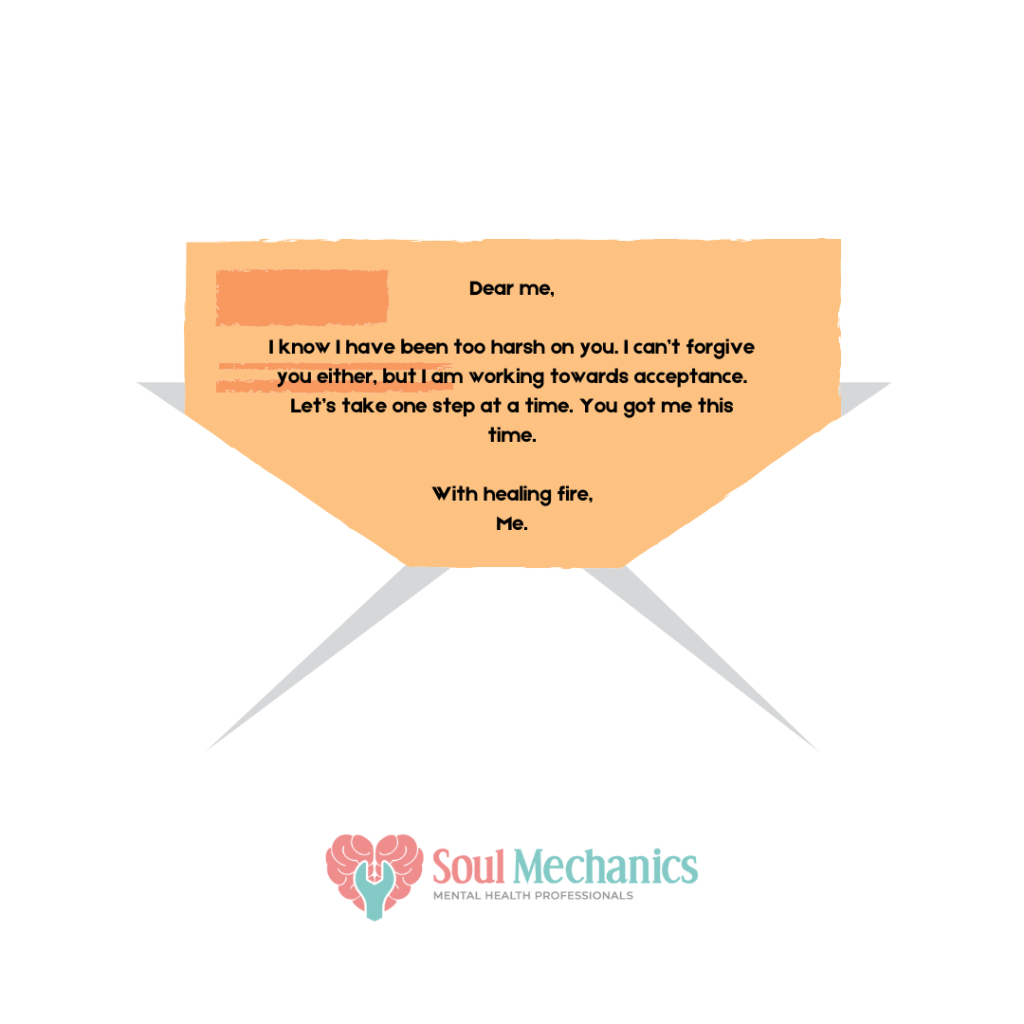
Rituals of Release - Create your personal ritual to symbolically release your guilt and shame. This could be writing down your emotions, burning them down, burying figurines or releasing balloons into the air. These rituals can provide you with a sense of closure and renewal.
Acts of Kindness - Engage yourself with random kindness acts towards others. Helping someone can shift your focus from self-criticism to connection and empathy. This cultivates a sense of positivity and worthiness.
Mindful Awareness - Practice mindfully being in the present moment. This mindfulness can navigate you to observe and accept these feelings without being engulfed or overwhelmed by them. This allows you to respond towards it more thoughtfully.
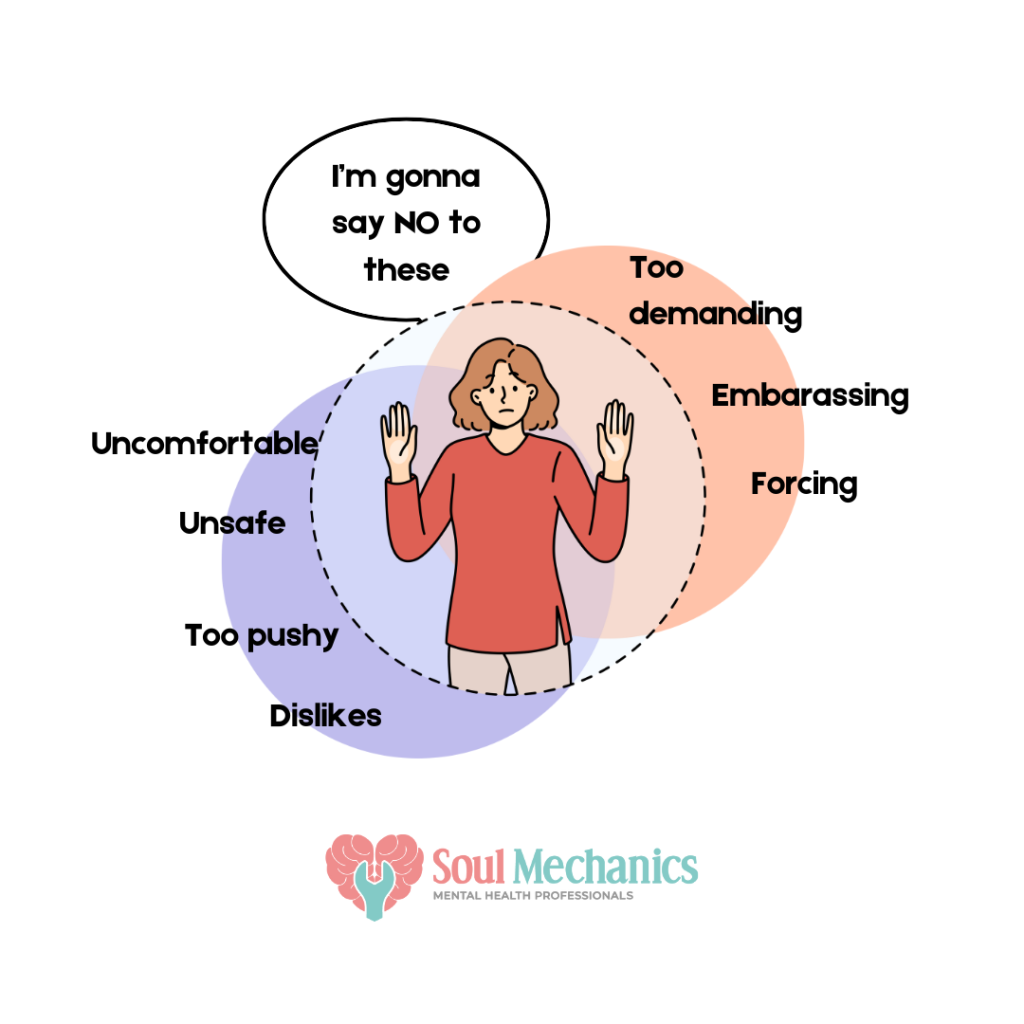
Boundaries Setting - Learn to set healthy yet firm boundaries to protect you from external factors of guilt and shame. Establishing clear boundaries assists you in managing the expectations of others and reduces unnecessary self-approach.
Acceptance Journey - Sometimes you can’t push yourself to forgive others, and that is okay. But, it is essential to work towards acceptance over time, which allows you to detangle from the burden of unresolved, heavy emotions. Acceptance allows you to address the reality of these situations and begin your healing although forgiveness may not be in the picture.
Reflection & Growth - Engage yourself in frequent self-reflection to identify and understand your roots of shame and guilt. These insights can further navigate you towards personal development and growth which would transform your experiences into life lessons for future resilience.
Conclusion
In short, both guilt and shame are powerful emotions that can significantly impact your life. By understanding their origin, addressing their impacts, and cultivating practical coping to manage them, you can transform these emotions into an opportunity for growth and self-compassion. Besides, therapy can provide you with invaluable support in this journey by navigating you through the complexities and heaviness of these emotions in a safe yet confidential space.
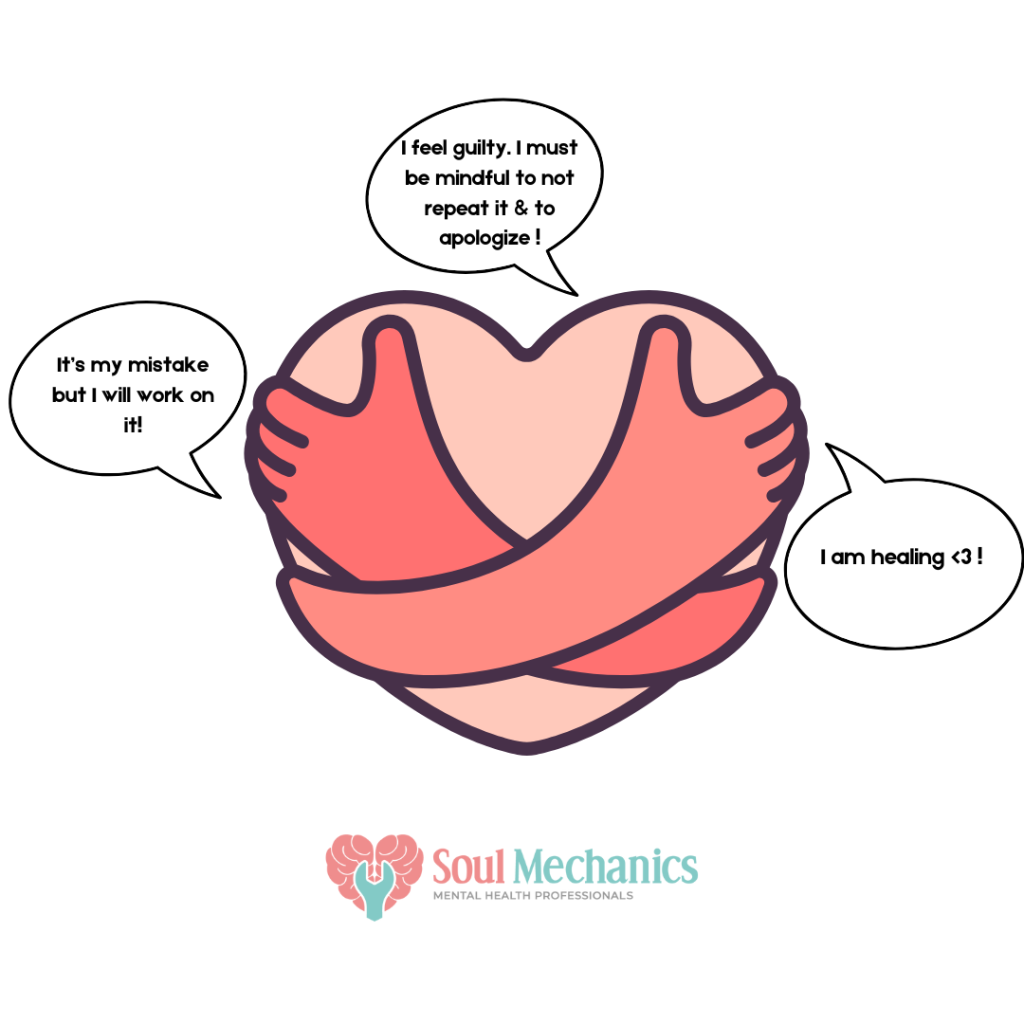
Remember, this journey may be tough, but worth the emotional freedom it offers.
If you’re looking for a therapist in Kota Damansara or Ipoh area, you can click here for more information.
If you enjoyed reading this, why not broaden the horizon of knowledge by learning about "Emotional Freedom: The Art of Letting Go"? You can read the blog here.
For more content related to mental health do follow us on our official Instagram.

